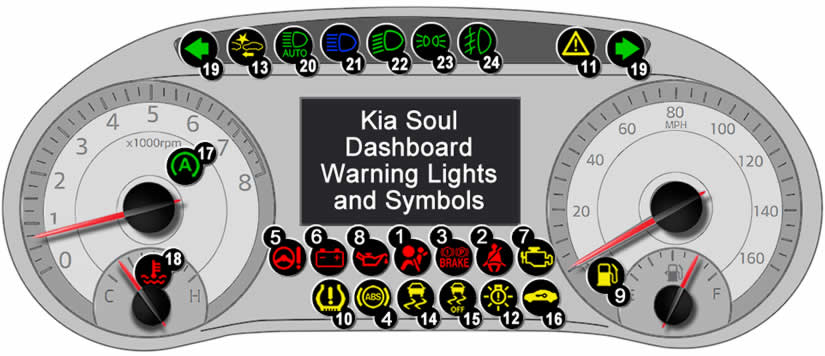Kia Soul Dashboard Lights Meaning
South Korean car manufacturer Kia has been producing the Kia Soul SUV since 2008 and is currently in its third generation. The Kia Soul dashboard warning lights will detail many of the warning and general symbols that you may see illuminate on your car’s dashboard.
Along with an image of the warning symbol, there will be a description of its meaning, plus the action to take based on the manufacturer’s recommendations.
 1. Airbag Warning
1. Airbag Warning
What is it: Airbag warning light.
Why is it on: It comes on indicating a problem with the airbag supplemental restraint system and/or the seat belt pretensioner system. The airbag light should go out shortly after the vehicle has started.
How to fix it: Common causes with the Kia Soul airbag warning light staying on can include issues with the seat belt buckle. Ensure the the switch inside the buckle is clear of debris. Cables and connections under the front seats can become dislodged. A worn or damaged airbag clock spring inside the steering column can also be a problem. Airbag crash sensors may also be an issue due to water damage or a minor impact.
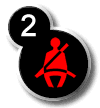 2. Seat Belt Warning
2. Seat Belt Warning
What is it: Airbag warning light.
Why is it on: If you start driving without the seat belt buckled up, or you fasten the seat belt when you drive over 5 mph and less than 12 mph, the warning light illuminates.
How to fix it: Fasten your seat belt. If the warning light remains lit, it may be debris lodged inside the seat belt buckle, or a problem with the passenger occupancy sensor in the seats.
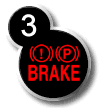 3. Brake Warning
3. Brake Warning
What is it: Brake warning light.
Why is it on: It comes on initially when the ignition switch is set to ON for around 3 seconds, then it should go out. If it stays on, it may mean the parking brake is applied. If the parking brake is properly released, it may indicate low brake fluid levels, or a fault in the brake circuit.
How to fix it: Check brake fluid levels. Level should be between the MIN and MAX on the reservoir tank. If low, top up using SAE J1703, FMVSS116 DOT 3, or DOT 4 brake fluid. When the vehicle is left overnight, check for fluid leaks on the floor. If after topping up with fluid the brake light remains lit, do not drive the vehicle and contact a Kia workshop.
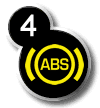 4. ABS Warning
4. ABS Warning
What is it: ABS (Anti-lock Braking System) warning light.
Why is it on: It stays constantly when there’s a fault with the Kia Soul Anti-lock Braking System. ABS prevents the wheels from locking when the driver presses the brake pedal in an emergency situation. By preventing the wheel from locking, it means the driver can continue to steer. ABS is a separate system to the vehicle’s brakes, therefore, the vehicle’s brake will not be affected by an ABS failure.
How to fix it: One of the more common reasons for an ABS fault is due to one of the possible four wheel speed sensors becoming damaged on the vehicle. Another reason could be a malfunctioning ABS module. Diagnostics may be required to locate the fault.
 5. Power Steering Warning
5. Power Steering Warning
What is it: The steering wheel and exclamation point is the power steering warning light. Depending on the model of Kia Soul, it may illuminate in red or yellow.
Why is it on: It indicates either a permeant or temporary fault with the Kia Soul’s electric power steering.
How to fix it: Sometimes power steering can stop working temporarily due to an overheated motor. Overheating can occur when steering for long period when parking, or when leaving the steering on full lock for an extended period of time when the engine is running. When the power steering motor has cooled down, normal operation will resume.
If the problem is constant, diagnostics will be required. Diagnostic tools can be used to read fault codes. These codes help to diagnose and locate the malfunctioning component.
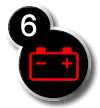 6. Charging System Warning
6. Charging System Warning
What is it: The red battery symbol stays permanently lit, or comes on while driving to indicate a problem in the electrical charging system.
Why is it on: It means there’s a fault in the electrical charging circuit.
How to fix it: The Kia Soul battery light comes on for the following reasons:
- Loose / corroded battery connections
- Ageing, failing battery
- Failing alternator
- Alternator drive belts loose or broken
- Electrical wiring issue
If you’re driving when the battery light comes on, it’s advised that you immediately switch off any electrical accessories that are not essential. Make your way to the nearest auto repair shop as the engine may shut down after a short time. See why is my car battery warning light on for further information.
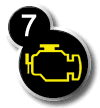 7. Engine Warning Light
7. Engine Warning Light
What is it: The engine warning light, or Malfunction Indicator Lamp (MIL) comes on when the on board diagnostic system has detected a fault with the engine emissions control system.
Why is it on: The emissions control system starts from the fuel filler cap, through the engine and all the way to the exhaust system. There are many potential component faults that can cause the engine warning light to come on.
How to fix it: In order to find out why the engine warning light is on, your Kia Soul will require diagnostics. Each time the engine light illuminates, a fault code is generated and stored. Diagnostic tools that plug into your vehicle will read these fault codes and provide you with information on the location of the fault. You can either use a auto repair shop’s diagnostic tools, or you can purchase your own.
For more information about the common reasons for the check engine warning light to come on, how to scan for Diagnostic Trouble Codes and what to do when the engine warning light comes on, see reasons why the engine warning light is on.
 8. Engine Oil Pressure
8. Engine Oil Pressure
What is it: Not to be confused with the low engine oil light, this light indicates low engine oil pressure.
Why is it on: Every car has its own engine oil pressure that’s appropriate for optimal operating, but it’s usually somewhere between 25 and 65 psi. The low engine oil pressure light comes on when this pressure is low. It’s dangerous because if there’s not enough pressure, it means that the oil may not be sufficiently lubricating engine components, which in turn can result in engine seizure.
How to fix it: Although the engine oil pressure warning light does not indicate low engine oil levels, low oil levels can cause low pressure. Check engine oil levels and top up if required. Avoid driving until the fault is rectified. Continued driving will cause significant engine damage. Some of the reasons that you may be seeing a low engine oil pressure light in your Kia Soul include:
- Low oil level
- Clogged oil filter
- Clogged pickup strainer
- Faulty oil pump
- Formation of sludge
- Faulty oil pressure sensor
- Incorrect oil type/viscosity
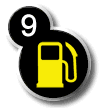 9. Low Fuel
9. Low Fuel
What is it: Low fuel warning light.
Why is it on: It comes on when the fuel tank is nearing empty.
How to fix it: Add fuel as soon as possible. Driving with the fuel light on, on when the fuel gauge needle is on empty (E), is can cause an engine misfire due air entering the fuel line. This can in return damage the catalytic converter.
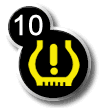 10. Low Tire Pressure
10. Low Tire Pressure
What is it: Low tire pressure warning light.
Why is it on: The Kia Soul low tire pressure warning light comes on for two possible reasons:
- Fixed: Indicates low pressure in one or more tires
- Flashes for one minute, then fixed: Indicates a problem with the Tire Pressure Monitoring System (TPMS)
How to fix it: Check tire pressures and inflate in accordance with the cold tire pressure label located on the driver’s side center pillar outer panel. The tire pressure warning light may illuminate due to:
- Using the spare tire (no sensor)
- In cold weather if pressure were adjusted during warm weather
- A damaged sensor, often during tired change
- Radio waves interfering with sensor and receiver
- A tire sealant used that’s not approved by Kia
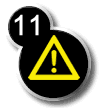 11. Master Warning
11. Master Warning
What is it: The yellow tringle containing an exclamation point is the Kia Soul master warning light.
Why is it on: The general purpose of the master warning light is to provide a warning of a problem or fault where a dedicated warning light is not used. The Kia Soul master warning light provides warnings and information for the following:
- Forward Collision Avoidance Assist (FCA) malfunction
- Forward Collision Avoidance Assist (FCA) sensor blocked
- Blind-Spot Collision Warning (BCW) malfunction
- Blind-Spot Collision Warning (BCW) radar blocked
- LED headlamp fault
- General lamp fault
- High Beam Assist (HBA) malfunction
- Smart Cruise Control (SCC) malfunction
- Smart Cruise Control (SCC) radar blocked
How to fix it: If you have a sensor or radar blocked warning message along with the master warning light, clean the radar located in the vehicle’s front grille, and the camera sensor located in front of the rear view mirror (windshield).
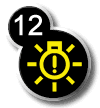 12. LED Headlamp
12. LED Headlamp
What is it: LED Headlamp warning light.
Why is it on: It comes on either steady or blinks when there’s a malfunction with the vehicle’s LED headlamps.
How to fix it: Vehicle will need diagnostics as an authorised Kia workshop to locate the fault. Continued driving with the LED headlamp fault light may reduce the lifespan of the headlamps.
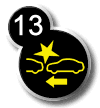 13. Forward Collision Alert
13. Forward Collision Alert
What is it: Forward Collision Alert warning light. The Forward Collision Alert (FCA) system warns the driver of possible collision with a vehicle or pedestrian ahead. If necessary, the FCA system can apply emergency braking.
Why is it on: The Kia Soul Forward Collision Alert warning light comes on for the following reasons:
- The FCA system has been turned off
- The radar sensor has been blocked
- There’s a malfunction with the FCA system
How to fix it: Check to ensure the FCA system is switched on. You can activate or deactivate FCA by going into ‘User Settings’, then ‘Driver Assistance’ and ‘Forward Collision Avoidance’.
Check to ensure the radar sensor located on the vehicle’s front grille is clean. IF the FCA system is still malfunctioning, take your vehicle to a Kia workshop.
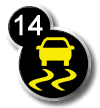 14. Electronic Stability Control
14. Electronic Stability Control
What is it: Electronic Stability Control (ESC) warning light. The Kia Soul ESC system provides the vehicle with additional stability by helping to reduce understeer, oversteer. ESC also has traction control which reduces wheel slip.
Why is it on: The ESC warning light comes on for two possible reasons:
- Steady: A fault with the ESC system
- Blinking / flickering: The ESC system is operational and actively attempting to stabilize the vehicle
How to fix it: If the ESC light is constantly on (fault), it’s often due to a damaged wheel speed sensor. Each car has 4 sensors, one located at each wheel. Due to their location, damage is often the problem. For more information, see What ESC is in Cars and How Does ESC Work in Cars.
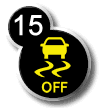 15. Electronic Stability Control OFF
15. Electronic Stability Control OFF
What is it: Electronic Stability Control (ESC) OFF warning light.
Why is it on: This symbol illuminates when the ESC is switched off.
How to fix it: ESC can be disabled manually in the system settings. It is recommended to keep ESC on at all times, but disabling ESC can prove beneficial if the vehicle is stuck in mud, snow etc.
Alternatively, ESC can on occasions be automatically disabled if there’s an engine management issue. This is to prevent ESC from engaging if reduced engine power is activated by the engine management system. You may have an engine warning light on. Once the engine fault has been rectified, ESC will be enabled.
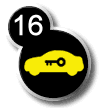 16. Immobilizer
16. Immobilizer
What is it: The key inside a car symbol is the Kia Soul security warning light.
Why is it on: The security / immobilizer warning light comes on when the Kia Soul detects the immobilizer transmitter inside the key. The immobilizer light should then go out once the engine has started. The immobilizer light flashes for two seconds, then goes off to indicate the vehicle cannot detect the smart key. The immobilizer continues to flash to indicate the battery in the smart key requires changing.
How to fix it: If the immobilizer light stays on steady after the engine has started, or flashes, there’s a fault with the immobilizer system (or that the battery in the smart key is weak). Try an alternative key if you have one. Problem may relate to immobilizer system inside the vehicle’s steering column.
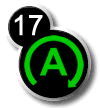 17. Auto Stop Start
17. Auto Stop Start
What is it: This green symbol is related to the Kia Soul’s Idle Stop and Go (ISG) system.
Why is it on: It illuminates when the system meets the appropriate operating condition and the engine automatically shuts down. If the Idle Stop and Go operating conditions are not met, you’ see the message Auto Stop conditions not met. The Kia Soul Idle Stop and Go (Auto Stop) will not work under the following conditions:
- The driver’s seat belt is not fastened
- The driver’s door is open
- The hood is open
- The brake vacuum pressure is too low
- The battery sensor has failed to activate
- The battery does not have sufficient charge
- The outside temperature is too high or too low
- The temperature inside the vehicle is not close enough to the temperature set on the climate control
- The engine is sufficiently warmed up
- The steering wheel has been turned more than 180 degrees when the vehicle has stopped
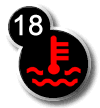 18. Engine Coolant Temperature
18. Engine Coolant Temperature
What is it: Engine coolant temperature gauge. You may also see the ‘Engine has overheated’ warning message that comes on when coolant temperature is above 248 °F (120 °C).
What to look for: Optimal engine coolant temperature will see the gauge reading halfway between the cold (C) and hot (H) range. The needle will fluctuate depending on outside temperature and vehicle engine load.
If the gauge pointer enters into the hot (H) area, it means the engine coolant is overheating. If this happens, pull off the road, place the gearshift lever into Park (P) and if the air conditioner is on, turn it off. If there’s steam coming from the engine, turn the engine off. If there’s no steam, leave the engine on idle and check to ensure the engine cooling fan is operating. If it isn’t switch off the engine.
Check also that the water pump drive belt is not missing and that there’s are no coolant leaks under the engine. If the coolant temperature doesn’t return to normal, switch off engine and allow to cool. When cool, check coolant levels and top up if required. For further information, see red engine coolant warning light on or flashing.
 19. Signals / Hazard Lights
19. Signals / Hazard Lights
What is it: Directional indicators / hazard warning lights.
Why is it on: The relevant directional arrow illuminate in green when a left or right signal is applied. Both arrows illuminate when the hazard warning lights are switched on.
 20. High Beam Assist
20. High Beam Assist
What is it: High beam assist warning light.
Why is it on: High beam assist automatically switches the headlamps between high beam and low beam. The system makes use of a camera sensors located in front of the rear view mirror. If high beam assist is not working properly, you’ll see the message: Check High Beam Assist and the master warning light will illuminate. Check to ensure the front windshield, particularly the area in front of the camera sensor is clean.
 21. High Beam
21. High Beam
What is it: High beam warning light.
Why is it on: The blue high beam symbol comes on when high beams / full beams are switched on. The symbol also illuminates when the turn signal lever is pulled to ‘flash’ your high beam headlights.
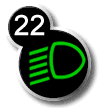 22. Low Beam
22. Low Beam
What is it: Low beam warning light.
Why is it on: This green low beam symbol comes on when the headlights are switched on.
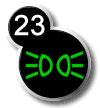 23. Lights On
23. Lights On
What is it: Lights on symbol.
Why is it on: This green symbol illuminates when the headlights or tail lights are on.
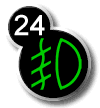 24. Front Fog Lights
24. Front Fog Lights
What is it: Front fog lights on symbol.
Why is it on: This green symbol illuminates when the front fog lights have been switched on.
Other Warning Lights
Other warning lights you may notice on your Kia Soul
 1. Lane Keeping Assist
1. Lane Keeping Assist
What is it: Lane keeping assist (LKA) warning light.
Why is it on: Lane keeping assist (LKA) detects lane line markers on the road and warns the driver by use of warning light and audible alert if the vehicle deviates from the driving lane, over a lane line without a turn signal applied.
The LKA system also applied gentle steering back into the direction on the lane. The symbol will illuminate in yellow if there’s a problem with the Lane Keeping Assist function. check to ensure the camera sensor located in front of the rear view mirror is not obscured.
 2. Icy Road Warning
2. Icy Road Warning
What is it: Icy road warning light.
Why is it on: The Kia Soul snowflake warning light warns you that the road may be icy. It illuminates when temperatures are below 240 °F (4 °C). For further information on the frost warning light, see snowflake dashboard warning light explained.
Warning Messages
Rather than a warning light, your Kia Soul’s dashboard may display a message.
‘Low key Battery for Smart Key’
This warning message means you need to change the battery in the smart key fob.
‘Press START Button While Turning Wheel for Smart Key system’
This warning message means you need to press the engine start/stop button while turning the steering wheel left and right.
‘Steering Wheel Unlocked for Smart Key System’
This warning message means the steering wheel is not locked when the engine start/stop button is in the OFF position. Turn the steering wheel to lock it.
‘Check Steering Wheel Lock System for Smart Key’
This warning message means there’s a malfunction in the steering wheel lock system.
‘Key Not in Vehicle for Smart Key System’
This warning message means the smart key is not in the vehicle when the engine start/stop button is in the ON position.
‘Battery Discharge Due to External Electrical Devices’
This warning message means the vehicle battery is discharging due to an external electrical device, such as an aftermarket dash cam. Idle stop and Go may be interrupted in this situation.
‘Press Start Button with Key for Smart Key System’
This warning message comes on when the engine start/stop button is pressed while the message ‘Key not Detected’ is displayed.
Drive Modes
These are the available drive modes on the Kia Soul, outside of normal driving mode. By pressing the drive modes button next to the gear selector lever, you can choose from the following modes:
 Sport Mode
Sport Mode
Sport mode allows the vehicle to be driven more dynamically. To do this, the vehicle maintains higher engine RPM by delaying the up gear shifting. Accelerator response is increased. This may increase the amount of fuel used.
 ECO Mode
ECO Mode
ECO mode allows the vehicle to be driven with fuel efficiency in mind. Accelerator response is slightly reduced, air conditioners performance may be reduced and the automatic gear shift patter will change.
